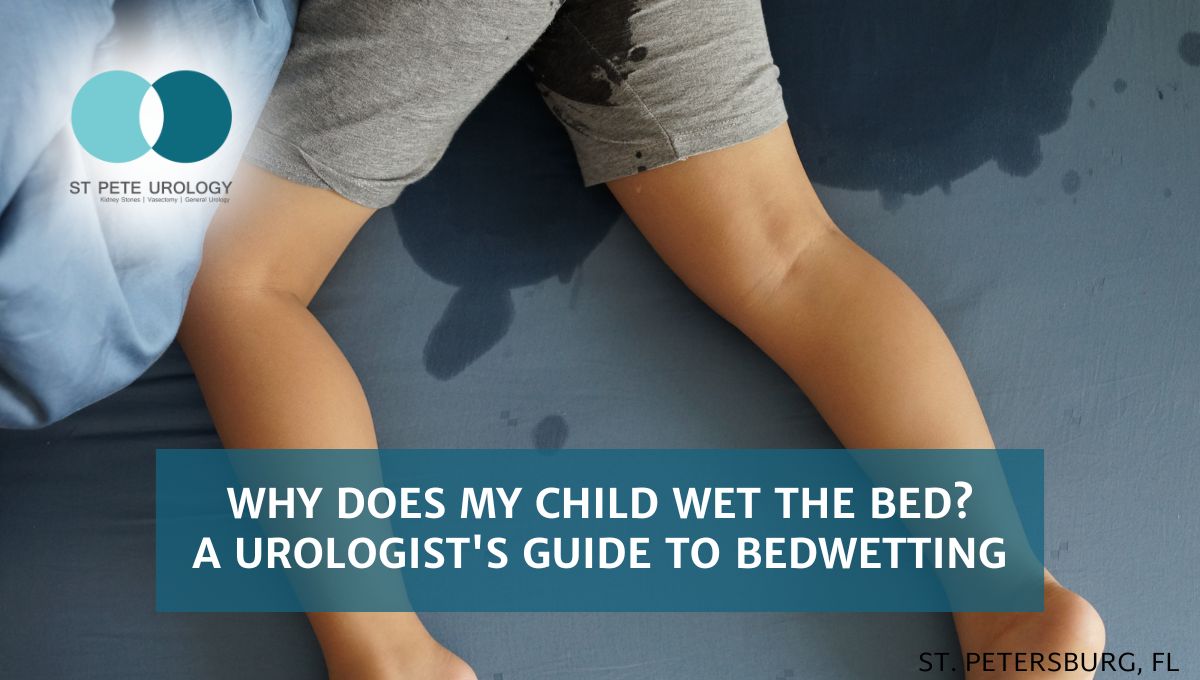3 Key Takeaways:
- Bedwetting is common and treatable – Affecting 15% of 5-year-olds and 5-7 million U.S. children total, nocturnal enuresis typically results from delayed bladder-brain communication, low vasopressin production, or constipation rather than behavioral issues.
- Professional evaluation is warranted after age 5 – Children experiencing bedwetting twice weekly for three months, or those with sudden onset after six months of dryness, should see a urologist to rule out underlying conditions and access proven treatment options.
- Multiple effective treatments exist – From behavioral modifications and bedwetting alarms (65% success rate) to medications like desmopressin, urologists at St. Pete Urology create personalized treatment plans that help children achieve dry nights and improved self-confidence.

Bedwetting affects 5 to 7 million children in the United States, making it one of the most common childhood concerns parents bring to urologists. If your child wets the bed after age 5, you’re not alone—and more importantly, effective help is available.
Bedwetting, medically known as nocturnal enuresis, is involuntary urination during sleep in children who are old enough to control their bladder. While most children achieve nighttime dryness by age 6 or 7, approximately 15% of 5-year-olds continue to experience bedwetting. Understanding the causes and knowing when to seek help from a urologist can make a significant difference for both your child and your family.
What Is Bedwetting (Nocturnal Enuresis)?
Nocturnal enuresis is classified into two main types. Primary enuresis occurs in children who have never achieved consistent nighttime dryness for a continuous six-month period. This is the most common form, affecting roughly 75% of children who wet the bed. Secondary enuresis happens when a child who has been dry at night for at least six months begins wetting the bed again, often in response to stress, illness, or underlying medical conditions.
The condition is slightly more common in boys than girls, and genetics play a significant role. If one parent experienced bedwetting beyond age 5, their child has a 40% chance of facing the same challenge. When both parents had childhood bedwetting, that likelihood increases to 70%.
Common Causes of Bedwetting in Children
The urinary system is complex, and several factors can contribute to bedwetting. At St. Pete Urology, our board-certified urologists evaluate each child’s unique situation to identify the underlying cause.
Delayed Bladder-Brain Communication
The most frequent cause of bedwetting is a developmental delay in the connection between the bladder and brain. When the bladder fills during sleep, it should send a signal to wake the child. In some children, this signal isn’t strong enough to interrupt deep sleep. This is particularly common in heavy sleepers, and it typically resolves as the neurological pathways mature.
Insufficient Vasopressin Production
Vasopressin is an antidiuretic hormone that naturally increases at night to reduce urine production. Some children don’t produce adequate levels of this hormone during sleep, causing their kidneys to continue making large amounts of urine that the bladder cannot hold. This explains why some children produce more urine overnight than their bladder capacity allows.
Small Functional Bladder Capacity
Children with bedwetting often have smaller functional bladder capacities than their peers. While their bladders may be physically normal in size, they may experience urgency to urinate when the bladder is only partially full. During the day, they can respond to these signals by going to the bathroom, but at night, this results in bedwetting.
Constipation
The relationship between constipation and bedwetting is stronger than many parents realize. The rectum sits directly behind the bladder, and when stool accumulates, it compresses the bladder space and nerves shared by both organs. According to research, treating constipation alone resolves bedwetting in approximately 50% of affected children.
Sleep-Disordered Breathing
Recent studies show that up to 30% of children with obstructive sleep apnea also experience bedwetting. Sleep apnea triggers the release of atrial natriuretic peptide, a hormone that causes the kidneys to produce extra urine during sleep. Our specialists work closely with pediatric sleep medicine experts when sleep-related breathing issues are suspected.
When to See a Urologist About Bedwetting
Most children outgrow bedwetting without intervention. However, certain situations warrant professional evaluation by a urologist who specializes in pediatric bladder conditions.
Schedule an appointment if your child experiences bedwetting twice weekly for three consecutive months after age 5. This frequency indicates that the issue isn’t likely to resolve quickly on its own. You should also consult a urologist if your child who has been consistently dry at night for six months or longer suddenly starts wetting the bed again, as this could signal an underlying medical condition.
Additional warning signs include bedwetting accompanied by painful urination, blood in the urine, excessive thirst, or daytime accidents in a child who was previously toilet trained. Children experiencing numbness, tingling, or weakness in their legs alongside bedwetting need immediate evaluation to rule out neurological issues.
At St. Pete Urology, we understand that bedwetting can significantly impact a child’s self-esteem and social development. Early evaluation helps prevent psychological distress and allows children to participate freely in sleepovers, camps, and other social activities without embarrassment.
How Urologists Evaluate Bedwetting
A thorough evaluation begins with a detailed medical history. The urologist will ask about your child’s voiding patterns, including daytime bathroom frequency, urgency episodes, and any history of urinary tract infections. They’ll also inquire about fluid intake habits, dietary factors, sleep patterns, and bowel movement regularity.
Physical examination includes assessment of the abdomen to check for constipation or bladder distension, examination of the genital area to rule out anatomical abnormalities, and neurological testing to ensure proper nerve function. A urinalysis is standard to screen for infections, diabetes, or kidney problems that could contribute to bedwetting.
In some cases, additional testing may include keeping a voiding diary for several days to track fluid intake, urination times and volumes, and bedwetting episodes. This provides valuable insights into bladder capacity and urine production patterns. Bladder ultrasound or other imaging studies may be recommended if structural abnormalities are suspected, particularly when children also experience daytime urinary symptoms.
Treatment Options for Childhood Bedwetting
Treatment approaches vary based on the underlying cause, the child’s age and motivation, and family preferences. According to the National Kidney Foundation, combining behavioral strategies with appropriate medical interventions yields the best results.
Behavioral Modifications
Lifestyle changes form the foundation of bedwetting management. Children should consume approximately two-thirds of their daily fluids by the end of the school day, with minimal fluid intake in the hour before bedtime. Establishing regular bathroom schedules during the day helps maintain healthy bladder function. Making bathrooms easily accessible at night with nightlights and clear pathways encourages children to wake and use the toilet when needed.
If constipation contributes to bedwetting, increasing dietary fiber, ensuring adequate hydration, and establishing regular bowel habits are essential first steps. Many families find that addressing constipation alone significantly reduces or eliminates bedwetting episodes.
Bedwetting Alarms
Research from the American Academy of Pediatrics shows that moisture-sensing alarms are highly effective, with approximately 65% of children responding successfully. These alarms detect the first drops of urine and wake the child with sound, vibration, or both. Over time, the alarm helps strengthen the bladder-brain connection.
Success with bedwetting alarms requires patience and family commitment. The child typically needs help responding to the alarm in the first few weeks. Full effectiveness may take 2-3 months, but alarm therapy offers excellent long-term cure rates with minimal side effects.
Medications
Desmopressin is the most commonly prescribed medication for bedwetting. It mimics natural vasopressin, reducing nighttime urine production. Studies show a 20-30% complete response rate, making it particularly helpful for children who produce excessive urine at night or need short-term relief for camps or sleepovers. Parents must monitor for potential side effects, including low sodium levels that can cause confusion or weakness.
In select cases, urologists may prescribe other medications such as oxybutynin for children with overactive bladder symptoms or imipramine for those who haven’t responded to other treatments. These medications require careful monitoring and are typically reserved for persistent cases.
Advanced Therapies
For children who don’t respond to standard treatments, our urologists may recommend specialized interventions. Biofeedback therapy teaches children to recognize and control bladder and pelvic floor muscles. Sacral neuromodulation, a treatment we offer for other bladder control issues, may be appropriate in rare cases of severe, treatment-resistant enuresis.
Finding Support and Moving Forward
Bedwetting is never a child’s fault, and punishment or shame only worsens the situation. The good news is that even without treatment, approximately 15% of affected children stop bedwetting each year as they mature. With proper evaluation and treatment, success rates improve significantly.
At St. Pete Urology in St. Petersburg, Florida, our experienced team understands the physical and emotional challenges bedwetting creates for families. Dr. Reid Graves, Dr. Nicholas Laryngakis, Dr. Adam Oppenheim, and Dr. Ankur Shah provide compassionate, evidence-based care tailored to each child’s needs. Using the latest diagnostic tools and treatment approaches, we help children achieve dry nights and the confidence that comes with them.
If your child struggles with bedwetting, don’t wait to seek help. Early intervention prevents years of unnecessary stress and helps children develop healthy bladder habits. Contact St. Pete Urology at (727) 478-1172 to schedule an evaluation. Our team is here to support your family with expert care, understanding, and proven solutions for childhood bedwetting.
References
- Daley, S. F., Gomez Rincon, M., & Leslie, S. W. (2024). Enuresis. In StatPearls. StatPearls Publishing. https://www.ncbi.nlm.nih.gov/books/NBK545181/
- National Kidney Foundation. (2025). Bedwetting in children & teens: Nocturnal enuresis. https://www.kidney.org/kidney-topics/bedwetting-children-teens-nocturnal-enuresis
- American Academy of Pediatrics. (2024). Bedwetting in children & teens: Nocturnal enuresis. HealthyChildren.org. https://www.healthychildren.org/English/health-issues/conditions/genitourinary-tract/Pages/Nocturnal-Enuresis-in-Teens.aspx
- Sleep Foundation. (2025). Bedwetting: Causes & treatments. https://www.sleepfoundation.org/children-and-sleep/bedwetting





